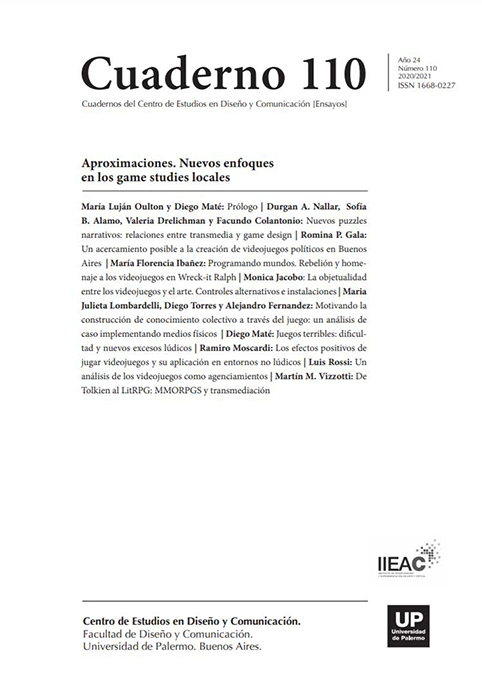Motivando la construcción de conocimiento colectivo a través del juego: un análisis de caso implementando medios físicos
Resumen
Actualmente, el juego es analizado como un elemento importante para motivar la interacción de usuarios en diferentes tipos de entornos. Este análisis ha derivado en promover diferentes estrategias para adaptar elementos propios de los juegos y los videojuegos en contextos que no están diseñados como tal, pero en los que se busca estimular la participación de los usuarios. Una estrategia al aplicar elementos de juego es considerar un modelo centrado en la experiencia del usuario. Sin embargo, para establecer un diseño de juego en contextos en donde prevalece el aspecto colaborativo, se requiere abordar estrategias específicas centradas en su relación con la comunidad a la que pertenece. Este artículo presenta el diseño de un entorno ludificado basado en el marco conceptual G.A.M.E. acrónimo de recopilación, análisis, modelado y ejecución (gathering, analysis, modeling and execution), aplicado a una comunidad de construcción colaborativa de conocimiento sobre Buenas Prácticas Hortícolas, complementado, además, con una interfaz física.
Citas
Azouz, O. y Lefdaoui, Y. (2018). Gamification design frameworks: A systematic mapping study. 2018 6th International Conference on Multimedia Computing and Systems (ICMCS), 1-9. Recuperado de: https://doi.org/10.1109/icmcs.2018.8525900
Brito, J., Vieira, V., & Duran, A. (2015). Towards a Framework for Gamification Design on Crowdsourcing Systems: The G.A.M.E. Approach. 2015 12th International Conference on Information Technology - New Generations, 445-450. https://doi.org/10.1109/ITNG.2015.78
Buckley, P., Noonan, S., Geary, C., Mackessy, T., & Nagle, E. (2019). An Empirical Study of Gamification Frameworks. Journal of Organizational and End User Computing (JOEUC), 31(1), 22-38.
Buenas prácticas agrícolas (2019). Wikipedia. https://es.wikipedia.org/w/index.php?title=Buenas_pr%C3%A1cticas_agr%C3%ADcolas&oldid=121829980
Crowdsourcing (2020). Wikipedia, la enciclopedia libre. Recuperado el 7 de Febrero de 2020 de https://es.wikipedia.org/wiki/Crowdsourcing
Cugelman, B. (2013). Gamification: What it is and why it matters to digital health behavior change developers. JMIR Serious Games, 1(1), e3-e3. PubMed. https://doi.org/10.2196/games.3139
Deterding, S., Dixon, D., Khaled, R. y Nacke, L. (2011). From Game Design Elements to Gamefulness: Defining «Gamification». Proceedings of the 15th International Academic MindTrek Conference: Envisioning Future Media Environments. 9–15. https://doi.org/10.1145/2181037.2181040 Featured articles. (2020). Wikipedia. Recuperado el 7 de Febrero de 2020 de https:// en.wikipedia.org/w/index.php?title=Wikipedia:Featured_articles
Garat, J. J., Ahumada, A., Otero, J., Terminiello, L., Bello, G. y Ciampagna, M. L. (2009). Las hortalizas típicas locales en el cinturón verde de La Plata: Su localización, preservación y valorización. Horticultura Argentina, 28(66), 32-39.
Hunicke, R., LeBlanc, M., & Zubek, R. (2004, July). MDA: A formal approach to game design and game research. Proceedings of the AAAI Workshop on Challenges in Game AI.
Interfaz de programación de aplicaciones (2019). Wikipedia. Recuperado el 7 de Febrero de 2020 de https://es.wikipedia.org/w/index.php?title=Interfaz_de_programaci%C3%B3n_ de_aplicaciones&oldid=122204387
Landers, R. N., Auer, E. M., Collmus, A. B. y Armstrong, M. B. (2018). Gamification science, its history and future: Definitions and a research agenda. Simulation & Gaming, 49(3), 315-337.
Lindsey, D. (2010). Evaluating quality control of Wikipedia’s feature articles. First Monday, 15(4). Recuperado de https://doi.org/10.5210/fm.v15i4.2721
Manney, P. J. (2008). Empathy in the Time of Technology: How Storytelling is the Key to Empathy. Journal of Evolution & Technology, 19(1).
Massa, G. D., Kim, H.-H., Wheeler, R. M. y Mitchell, C. A. (2008). Plant Productivity in Response to LED Lighting. HortScience, 43(7), 1951-1956. Recuperado de https://doi.org/10.21273/HORTSCI.43.7.1951
MediaWiki. (s. f.). Recuperado 25 de enero de 2020, de https://www.mediawiki.org/wiki/
MediaWiki Mondada, F. y Legon, S. (2001). Interactions between Art and Mobile Robotic System Engineering. T. Gomi (Ed.) Evolutionary Robotics. From Intelligent Robotics to Artificial Life (pp. 121–137). Springer: Berlin.
Mora, A., Riera, D., González, C., & Arnedo-Moreno, J. (2017). Gamification: A systematic review of design frameworks. Journal of Computing in Higher Education, 29(3), 516-548. Recuperado de https://doi.org/10.1007/s12528-017-9150-4
Morschheuser, B., Hamari, J., & Koivisto, J. (2016, January). Gamification in crowdsourcing: a review. In 2016 49th Hawaii International Conference on System Sciences (HICSS) (pp. 4375-4384). IEEE.
Morschheuser, B., Hamari, J., Koivisto, J. y Maedche, A. (2017). Gamified crowdsourcing: Conceptualization, literature review, and future agenda. International Journal of HumanComputer Studies, 106, 26-43.
Morschheuser, B., Hamari, J. y Maedche, A. (2019). Cooperation or competition – When do people contribute more? A field experiment on gamification of crowdsourcing. International Journal of Human-Computer Studies, 127, 7-24. Recuperado de https://doi.org/10.1016/j.ijhcs.2018.10.001
Narayan, S., Orlowitz, J., Morgan, J., Hill, B. M., & Shaw, A. (2017, February). The Wikipedia Adventure: field evaluation of an interactive tutorial for new users. Proceedings of the 2017 ACM Conference on Computer Supported Cooperative Work and Social Computing (pp. 1785-1799).
Oceja, J., & Sierra-Obregón, Á. (2018, October). Gamifiying Wikipedia?. In European Conference on Games Based Learning (pp. 504-XXII). Academic Conferences International Limited.
Papale, L. (2014, junio 22). Beyond Identification: Defining the Relationships between Player and Avatar. Journal of Games Criticism. Recuperado de: http://gamescriticism.org/articles/papale-1-2
Outreach Wiki. (s. f.). The Wikipedia Adventure. Recuperado 23 de enero de 2020. Recuperado de: https://outreach.wikimedia.org/wiki/The_Wikipedia_Adventure
Torres, D., Díaz, A., Cepeda, V., Correa, F. y Fernández, A. (2017). Nodos: Encyclopedia of the Performing Arts. Revista Colombiana de Computación, 18(2), 33-46. Recuperado de https://doi.org/10.29375/25392115.3216
Uchoa, A. P., Esteves, M. G. P. y Souza, J. M. de. (2013). Mix4Crowds - Toward a framework to design crowd collaboration with science. Proceedings of the 2013 IEEE 17th International Conference on Computer Supported Cooperative Work in Design (CSCWD), 61-66. Recuperado de https://doi.org/10.1109/CSCWD.2013.6580940
Wenger, E. (2020). Communities Of Practice: A Brief Introduction. STEP Leadership Workshop. University of Oregon. Recuperado de https://scholarsbank.uoregon.edu/xmlui/handle/1794/11736
The Distributed Game. (s. f.). Wikidata. Recuperado 11 de abril de 2019. Recuperado de https://tools.wmflabs.org/wikidata-game/distributed/
Wikipedia. (2020) Wikipedia. Recuperado el 7 de Febrero de 2020. Recuperado de https://es.wikipedia.org/w/index.php?title=Wikipedia
WikiCup (2020). Wikipedia. Recuperado de https://en.wikipedia.org/w/index.php?title=Wikipedia:WikiCup
Wöhner, T., & Peters, R. (2009, October). Assessing the quality of Wikipedia articles with lifecycle based metrics. Proceedings of the 5th International Symposium on Wikis and Open Collaboration (pp. 1-10).
Los autores/as que publiquen en esta revista ceden los derechos de autor y de publicación a "Cuadernos del Centro de Estudios de Diseño y Comunicación", Aceptando el registro de su trabajo bajo una licencia de atribución de Creative Commons, que permite a terceros utilizar lo publicado siempre que de el crédito pertinente a los autores y a esta revista.


